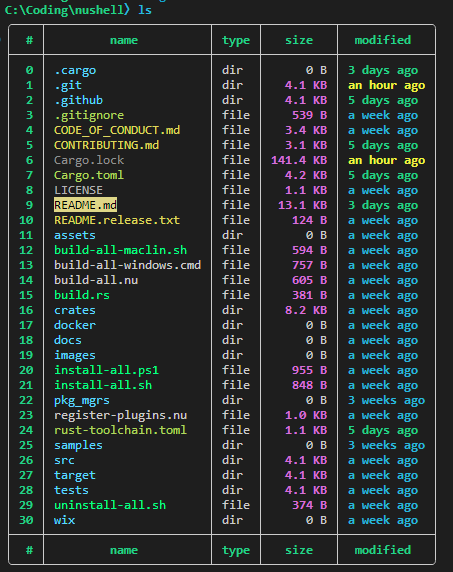mirror of
https://github.com/nushell/nushell.git
synced 2025-07-24 23:25:23 +02:00
# Description Closes #6909. You can now add closures to your `color_config` themes. Whenever a value would be printed with `table`, the closure is run with the value piped-in. The closure must return either a {fg,bg,attr} record or a color name (`'light_red'` etc.). This returned style is used to colour the value. This is entirely backwards-compatible with existing config.nu files. Example code excerpt: ``` let my_theme = { header: green_bold bool: { if $in { 'light_cyan' } else { 'light_red' } } int: purple_bold filesize: { |e| if $e == 0b { 'gray' } else if $e < 1mb { 'purple_bold' } else { 'cyan_bold' } } duration: purple_bold date: { (date now) - $in | if $in > 1wk { 'cyan_bold' } else if $in > 1day { 'green_bold' } else { 'yellow_bold' } } range: yellow_bold string: { if $in =~ '^#\w{6}$' { $in } else { 'white' } } nothing: white ``` Example output with this in effect:    Slightly important notes: * Some color_config names, namely "separator", "empty" and "hints", pipe in `null` instead of a value. * Currently, doing anything non-trivial inside a closure has an understandably big perf hit. I currently do not actually recommend something like `string: { if $in =~ '^#\w{6}$' { $in } else { 'white' } }` for serious work, mainly because of the abundance of string-type data in the world. Nevertheless, lesser-used types like "date" and "duration" work well with this. * I had to do some reorganisation in order to make it possible to call `eval_block()` that late in table rendering. I invented a new struct called "StyleComputer" which holds the engine_state and stack of the initial `table` command (implicit or explicit). * StyleComputer has a `compute()` method which takes a color_config name and a nu value, and always returns the correct Style, so you don't have to worry about A) the color_config value was set at all, B) whether it was set to a closure or not, or C) which default style to use in those cases. * Currently, errors encountered during execution of the closures are thrown in the garbage. Any other ideas are welcome. (Nonetheless, errors result in a huge perf hit when they are encountered. I think what should be done is to assume something terrible happened to the user's config and invalidate the StyleComputer for that `table` run, thus causing subsequent output to just be Style::default().) * More thorough tests are forthcoming - ran into some difficulty using `nu!` to take an alternative config, and for some reason `let-env config =` statements don't seem to work inside `nu!` pipelines(???) * The default config.nu has not been updated to make use of this yet. Do tell if you think I should incorporate that into this. # User-Facing Changes See above. # Tests + Formatting Don't forget to add tests that cover your changes. Make sure you've run and fixed any issues with these commands: - `cargo fmt --all -- --check` to check standard code formatting (`cargo fmt --all` applies these changes) - `cargo clippy --workspace --features=extra -- -D warnings -D clippy::unwrap_used -A clippy::needless_collect` to check that you're using the standard code style - `cargo test --workspace --features=extra` to check that all tests pass # After Submitting If your PR had any user-facing changes, update [the documentation](https://github.com/nushell/nushell.github.io) after the PR is merged, if necessary. This will help us keep the docs up to date.
nu-protocol
The nu-protocol crate holds the definitions of structs/traits that are used throughout Nushell. This gives us one way to expose them to many other crates, as well as make these definitions available to each other, without causing mutually recursive dependencies.